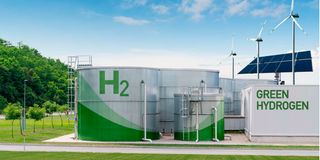Africa’s clean energy future is within reach, if we choose it

A 100 per cent renewable energy future for Africa is technically feasible.
What you need to know:
- Africa could save between $3–5 trillion by 2050 by transitioning to a fully renewable energy system.
- A 100 per cent renewable energy pathway would support 5.4 million energy jobs by 2050.
Africa stands at a crossroads. One path leads to a future shackled by fossil fuel dependency, mounting debt, and deepening inequality. The other offers a bold, people-centred vision powered by clean, renewable energy; one that promises prosperity, resilience, and energy sovereignty. A new report makes the choice abundantly clear.
The report, African Energy Leadership: The Case for 100 per cent Renewable Energy, reveals that Africa could save between $3–5 trillion by 2050 by transitioning to a fully renewable energy system. That’s an average of $150 billion annually, money that could be reinvested in healthcare, education, and infrastructure. More than just a cost-saving measure, this transition would unlock millions of new jobs, accelerate development, and deliver universal access to modern, affordable energy.
This is not a pipe dream. The research by Power Shift Africa confirms that a 100 per cent renewable energy future is not only technically feasible, but also the cheapest, healthiest, and most equitable route for Africa’s development. Solar and wind technologies are now the most cost-effective forms of power generation globally. They are fast to deploy, increasingly modular, and perfectly suited to Africa’s geography and demographics.
New energy vision
Currently, nearly half of all Africans, around 720 million people, live more than 10 kilometres from a power line. Many rely on polluting fuels like charcoal and wood for cooking, with devastating health and environmental consequences. The report shows that decentralised, off-grid renewable solutions, such as mini-grids and electric cooking technologies, can close this energy access gap faster and more affordably than traditional grid expansion.
The numbers are staggering. A 100 per cent renewable energy pathway would support 5.4 million energy jobs by 2050, compared to just 3.2 million under current fossil fuel trajectories. It would require only 3,500GW of installed renewable capacity, or less than 1 per cent of Africa’s vast potential. Most of this would come from solar, supported by wind, energy storage, and modernised power grids.
But this future is not guaranteed. Structural barriers, such as debt burdens, limited access to grants, and the hoarding of clean technology patents by global north countries, are holding Africa back. The report warns against the seductive but dangerous narrative that fossil fuel expansion is necessary for development. In reality, such investments risk locking the continent into stranded assets and exposing it to volatile global oil and gas markets.
Indeed, the report calls for a new energy vision rooted in African ownership, regional industrialisation, and energy sovereignty. It urges international action to cancel unjust debt, overhaul the global financial system, and scale up public climate and development finance. It also advises African leaders to embed energy planning into development agendas and reject false solutions that perpetuate dependency on fossil fuels.
Creating decent jobs
This is about more than megawatts and gigawatts. It’s about reclaiming our power, literally and figuratively. It’s about ensuring that every African has access to clean, reliable electricity. It is about creating decent jobs, supporting sustainable industries, and protecting our environment for future generations.
The report also highlights the transformative potential of clean cooking. Today, around 70 per cent of Africa’s energy used for cooking and heating comes from traditional biomass. Transitioning to electric cooking by 2050 would yield massive health, environmental, and economic benefits. But it will require targeted policies, consumer incentives, and infrastructure investment.
Africa has the rare advantage of being able to leapfrog the dirty energy systems of the past. With minimal existing fossil fuel infrastructure, we can move straight to modern, decentralised renewables. Solar alone has a theoretical potential of over 480,000GW. By 2050, we would need just 2,615GW of solar PV and 625GW of wind power - using less than 1 per cent of Africa’s landmass.
This is a moment of choice. The science is clear. The economics are compelling. The technology is ready. What remains is the political will.
Mohamed Adow is a Director of Power Shift Africa


